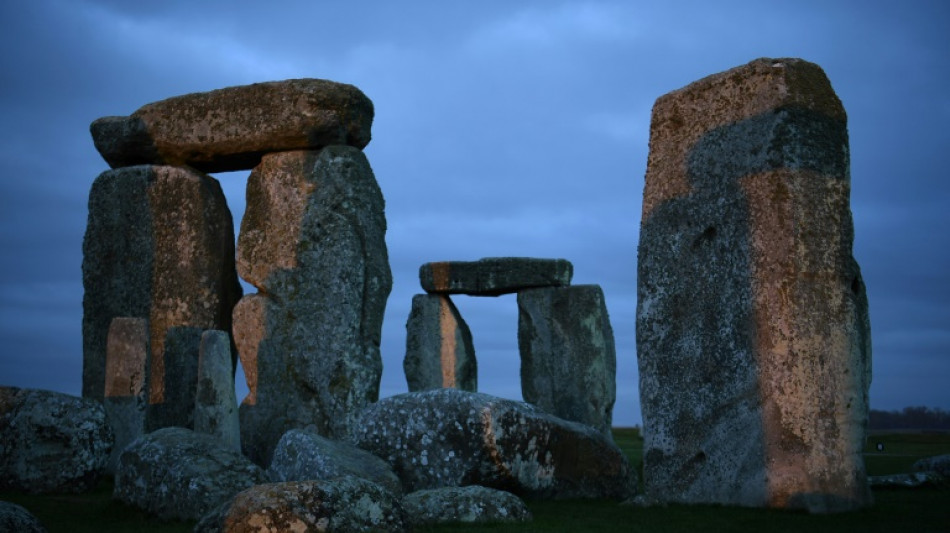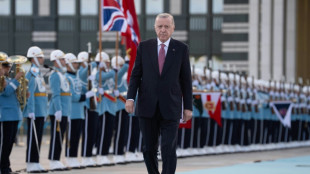
-
 Gauff-led holders USA to face Spain, Argentina at United Cup
Gauff-led holders USA to face Spain, Argentina at United Cup
-
Ecuador voters reject return of US military bases

-
 Bodyline and Bradman to Botham and Stokes: five great Ashes series
Bodyline and Bradman to Botham and Stokes: five great Ashes series
-
Iran girls kick down social barriers with karate

-
 Asian markets struggle as fears build over tech rally, US rates
Asian markets struggle as fears build over tech rally, US rates
-
Australia's 'Dad's Army' ready to show experience counts in Ashes

-
 UN Security Council set to vote on international force for Gaza
UN Security Council set to vote on international force for Gaza
-
Japan-China spat sinks tourism stocks

-
 Ecuador voters set to reject return of US military bases
Ecuador voters set to reject return of US military bases
-
Trump signals possible US talks with Venezuela's Maduro

-
 Australian Paralympics gold medallist Greco dies aged 28
Australian Paralympics gold medallist Greco dies aged 28
-
Leftist, far-right candidates go through to Chilean presidential run-off

-
 Zelensky in Paris to seek air defence help for Ukraine
Zelensky in Paris to seek air defence help for Ukraine
-
Bangladesh verdict due in ex-PM's crimes against humanity trial

-
 A pragmatic communist and a far-right leader: Chile's presidential finalists
A pragmatic communist and a far-right leader: Chile's presidential finalists
-
England ready for World Cup after perfect campaign

-
 Cervical cancer vaccine push has saved 1.4 million lives: Gavi
Cervical cancer vaccine push has saved 1.4 million lives: Gavi
-
World champion Liu wins Skate America women's crown

-
 Leftist leads Chile presidential poll, faces run-off against far right
Leftist leads Chile presidential poll, faces run-off against far right
-
Haaland's Norway thump sorry Italy to reach first World Cup since 1998

-
 Portugal, Norway book spots at 2026 World Cup
Portugal, Norway book spots at 2026 World Cup
-
Sinner hails 'amazing' ATP Finals triumph over Alcaraz

-
 UK govt defends plan to limit refugee status
UK govt defends plan to limit refugee status
-
Haaland's Norway thump Italy to qualify for first World Cup since 1998

-
 Sweden's Grant captures LPGA Annika title
Sweden's Grant captures LPGA Annika title
-
Tuchel lays down law to Bellingham after England star's frustration

-
 Sinner caps eventful year with ATP Finals triumph over great rival Alcaraz
Sinner caps eventful year with ATP Finals triumph over great rival Alcaraz
-
Portugal book spot at 2026 World Cup as England stay perfect

-
 Hakimi, Osimhen, Salah shortlisted for top African award
Hakimi, Osimhen, Salah shortlisted for top African award
-
Sinner beats great rival Alcaraz to retain ATP Finals title

-
 Schenk wins windy Bermuda Championship for first PGA title
Schenk wins windy Bermuda Championship for first PGA title
-
Crime, immigration dominate as Chile votes for president

-
 Kane double gives England record-setting finish on road to World Cup
Kane double gives England record-setting finish on road to World Cup
-
World champions South Africa add Mbonambi, Mchunu to squad

-
 Greenpeace says French uranium being sent to Russia
Greenpeace says French uranium being sent to Russia
-
'Now You See Me' sequel steals N. American box office win

-
 Argentina beat Scotland after frenzied fightback
Argentina beat Scotland after frenzied fightback
-
Argentina beat Scotland after stunning fightback

-
 Pope urges leaders not to leave poor behind
Pope urges leaders not to leave poor behind
-
Pressure will boost Germany in 'knockout' Slovakia clash, says Nagelsmann

-
 Ecuador votes on hosting foreign bases as Noboa eyes more powers
Ecuador votes on hosting foreign bases as Noboa eyes more powers
-
Portugal qualify for 2026 World Cup by thrashing Armenia

-
 Greece to supply winter gas to war battered Ukraine
Greece to supply winter gas to war battered Ukraine
-
India and Pakistan blind women show spirit of cricket with handshakes

-
 Ukraine signs deal with Greece for winter deliveries of US gas
Ukraine signs deal with Greece for winter deliveries of US gas
-
George glad England backed-up haka response with New Zealand win

-
 McIlroy loses playoff but clinches seventh Race to Dubai title
McIlroy loses playoff but clinches seventh Race to Dubai title
-
Ecuador votes on reforms as Noboa eyes anti-crime ramp-up

-
 Chileans vote in elections dominated by crime, immigration
Chileans vote in elections dominated by crime, immigration
-
Turkey seeks to host next COP as co-presidency plans falter


Stonehenge mystery deepens as altar traced to Scotland
A central stone of the famous Stonehenge monument in southwest England came from 750 kilometres away in northeast Scotland, surprised scientists said Wednesday, solving one mystery but raising another: how did its prehistoric builders move the huge slab so far?
The Neolithic circle of giant stones has been a source of wonder and mystery for nearly 5,000 years -- in the Middle Ages, the wizard Merlin of Arthurian legend was said to have stolen the monument from Ireland.
More recently, scientists have determined that the site's upright sandstones came from relatively nearby Marlborough, while the bluestones arrayed near its centre came from Wales.
But the origin of the Altar Stone, a unique six-tonne slab laying on its side at the heart of the circle, remained elusive.
It was long thought to have also come from Wales, but tests along those lines always "drew a blank," said Richard Bevins, a professor from Aberystwyth University, mid-Wales, and co-author of a new study.
This prompted a team of British and Australian researchers to broaden their horizons -- and in turn discover something "quite sensational", he told AFP.
Using chemical analysis, they determined that the Altar Stone came from Scotland's Orcadian Basin, which is at least 750 kilometres (460 miles) from Stonehenge, according to the study in the journal Nature.
- 'Genuinely shocking' -
The researchers were stunned.
"This is a genuinely shocking result," study co-author Robert Ixer of University College London said in a statement.
The "astonishing" distance was the longest recorded journey for any stone at the time, said fellow co-author Nick Pearce of Aberystwyth University.
Whether people around 2,500 BC were capable of transporting such huge stones from Wales had already been a matter of heated debate among archaeologists and historians.
That a five-by-one-metre (16-by-three-feet) stone made the trip across much of the length of the UK suggests that the British isles were home to a highly organised and well-connected society at the time, the researchers said.
They called for further research to find out exactly where in Scotland the stone came from -- and how it made its way to Stonehenge.
One theory is that the stone was brought to southern England not by humans but by naturally moving ice flows.
However research has shown that ice would actually have carried such stones "northwards, away from Stonehenge", lead study author Anthony Clarke from Australia's Curtin University told a news conference.
Another option was that the Neolithic builders moved the stones over land -- though this would have been extraordinarily difficult.
Dense forest, marshy bogs and mountains all formed "formidable barriers" for prehistoric movers, Clarke said.
- 'Incredibly important' -
Another option is that the stone was transported by sea.
There is evidence of an "extensive network of Neolithic shipping," which moved pottery and gems around the region, Clarke said.
To work out where it came from, the researchers fired laser beams into the crystals of a thin slice of the Altar Stone.
The ratio of uranium and lead in these crystals act as "miniature clocks" for rocks, providing their age, said study co-author Chris Kirkland of Curtin University.
The team then compared the stone's age to other rocks across the UK and found "with a high degree of certainty" that it came from the Orcadian Basin, Kirkland said.
Susan Greaney, an archaeologist at the UK's University of Exeter not involved in the study, said it established the first "direct link" between southern England and northern Scotland during this time.
"The placement of this stone at the heart of the monument, on the solstice axis, shows that they thought this stone, and by implication, the connection with the area to the north, was incredibly important," she told AFP.
H.Darwish--SF-PST




